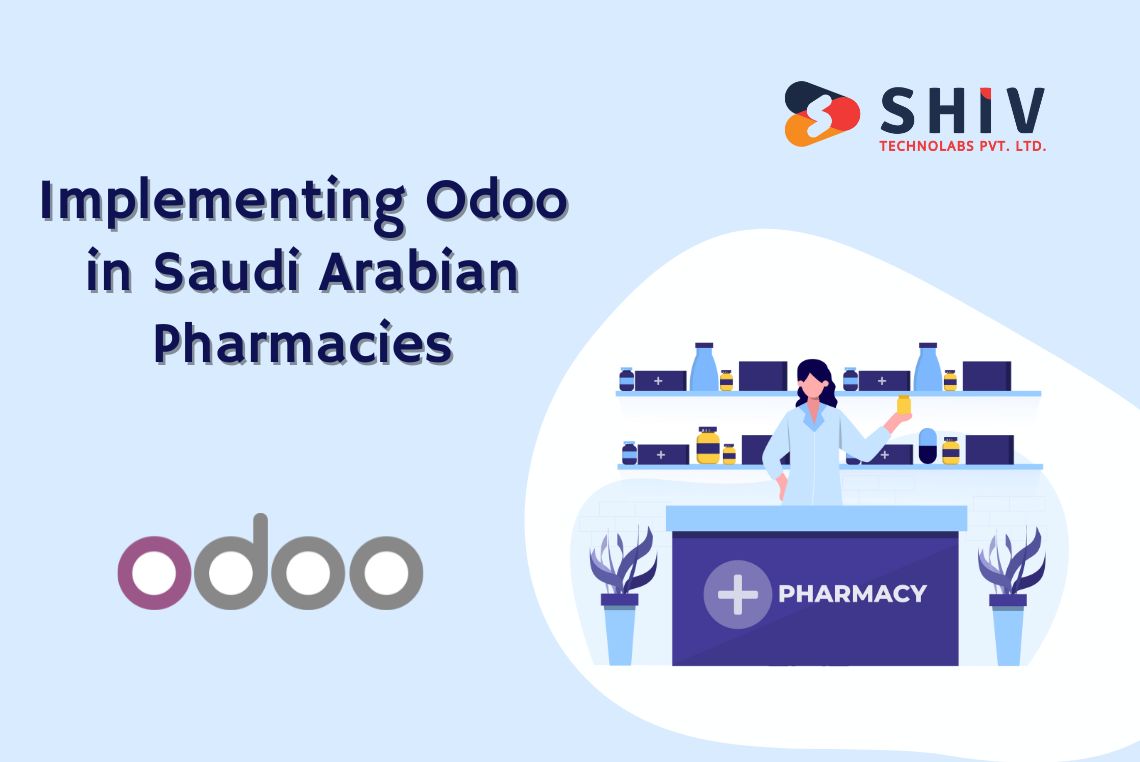Table of Contents
The pharmaceutical industry in Saudi Arabia has witnessed significant growth in recent years, driven by increased demand for healthcare services and the expansion of the healthcare infrastructure. To keep pace with this growth, pharmacies in the region are increasingly turning to modern technological solutions like Enterprise Resource Planning (ERP) systems. Among these, Odoo stands out as a versatile and powerful tool that can address the unique challenges faced by pharmacies. With its modular approach and user-friendly interface, Odoo offers a tailored solution for managing everything from inventory and sales to customer relations and regulatory compliance.
Importance of ERP Systems in Saudi Pharmacies

ERP systems have become an essential part of pharmacy management, particularly in a market as dynamic as Saudi Arabia’s. The ability to manage multiple aspects of pharmacy operations through a single platform helps streamline processes, reduce errors, and improve overall efficiency.
In a country where healthcare regulations are stringent, and customer expectations are high, implementing an ERP system like Odoo can significantly enhance the operational efficiency and profitability of a pharmacy. The integration of Odoo into pharmacy operations not only simplifies daily tasks but also provides valuable insights that can drive better decision-making and long-term planning.
Understanding Odoo ERP for Pharmacies
# Key Features of Odoo for Pharmacy Management
Odoo offers a wide range of features specifically designed to meet the needs of the pharmaceutical industry. Some of the key features include:
- Inventory Management: Odoo provides a robust inventory management system that allows pharmacies to track stock levels in real-time, manage expiration dates, and automate reordering processes. This reduces the risk of stockouts or overstocking, which can directly impact customer satisfaction and profitability.
- Sales Management: The sales module in Odoo enables pharmacies to handle customer orders efficiently, process payments, and manage loyalty programs. The system also supports various sales channels, including in-store and online, making it easier for pharmacies to adapt to changing consumer preferences.
- Purchase Management: Odoo’s purchase management module helps pharmacies manage supplier relationships, track purchase orders, and monitor delivery schedules. This module is particularly useful in maintaining a consistent supply of medications and other products, ensuring that pharmacies can meet customer demands.
- Customer Relationship Management (CRM): The CRM module allows pharmacies to manage customer interactions, track purchase history, and offer personalized services. This can lead to increased customer loyalty and repeat business.
- Compliance Management: Odoo helps pharmacies adhere to local regulatory requirements by automating the documentation and reporting processes. This is crucial in a country like Saudi Arabia, where compliance with healthcare regulations is strictly enforced.
- Financial Management: The financial management module provides pharmacies with tools to manage billing, payments, and accounting. It also offers detailed financial reports that can help pharmacies monitor their financial health and make informed business decisions.
Why Choose Odoo for Saudi Pharmacies?

The choice of Odoo as an ERP system for pharmacies in Saudi Arabia is driven by several factors. First, Odoo’s modular architecture allows pharmacies to start with the most critical modules and expand as their needs grow. This flexibility makes it an ideal solution for both small independent pharmacies and large pharmacy chains. Second, Odoo is highly customizable, allowing pharmacies to tailor the system to their specific requirements. Finally, Odoo’s open-source nature means that it is cost-effective and supported by a large community of developers, ensuring that pharmacies have access to ongoing updates and improvements.
Preparing for Odoo Implementation
# Assessing Your Pharmacy’s Needs
Before implementing Odoo, it is essential to conduct a thorough assessment of your pharmacy’s needs. This involves evaluating current workflows, identifying pain points, and determining which Odoo modules will address these issues. For example, if your pharmacy struggles with inventory management, the inventory module should be a top priority. Additionally, consider the size of your pharmacy, the number of locations, and the level of integration required with other systems. This assessment will help you create a clear roadmap for implementation and set realistic goals for what you want to achieve with Odoo.
# Defining Goals and Objectives
Once you have assessed your pharmacy’s needs, the next step is to define clear goals and objectives for the Odoo implementation. These goals should be specific, measurable, and aligned with your overall business strategy. For instance, you might aim to reduce stock discrepancies by 20% within the first six months or improve customer satisfaction scores by implementing a CRM module. Having well-defined goals will guide the implementation process and help you measure success.
# Selecting the Right Odoo Modules for Your Pharmacy
Odoo offers a wide range of modules, but not all of them may be relevant to your pharmacy. Based on your needs assessment, prioritize the modules that will have the most significant impact on your operations. For most pharmacies, inventory management, sales, purchase management, and CRM are essential. However, you may also consider modules for HR management, marketing, or point-of-sale systems, depending on your specific requirements. Selecting the right modules is critical to maximizing the benefits of Odoo and avoiding unnecessary complexity.
The Implementation Process
# Step-by-Step Guide to Implementing Odoo
Implementing Odoo in your pharmacy requires careful planning and execution. Here is a step-by-step guide to help you through the process:
- Project Planning: Begin by creating a detailed project plan that outlines the scope, timeline, and resources required for the implementation. Assign roles and responsibilities to your team members and establish a clear communication plan.
- System Configuration: Once your project plan is in place, start configuring the Odoo modules according to your pharmacy’s needs. This may involve setting up user roles, defining workflows, and customizing the system to match your business processes.
- Data Migration: Migrate existing data from your current systems to Odoo. This includes customer records, inventory data, and financial information. It is essential to clean and validate the data before migration to avoid issues down the line.
- Testing: Before going live, conduct thorough testing of the system to identify and resolve any issues. This includes testing individual modules as well as the overall integration of the system.
- Go-Live: Once testing is complete, you can move to the go-live phase. This involves switching from your old system to Odoo and making the system available to all users. It is advisable to have a support team on standby to address any issues that may arise during this transition.
# Customizing Odoo to Meet Saudi Pharmacy Regulations
Pharmacies in Saudi Arabia must comply with strict healthcare regulations, and Odoo can be customized to help meet these requirements. This may involve configuring the system to handle specific reporting formats, managing controlled substances, or ensuring that all transactions are recorded according to local laws. Customization is often necessary to align Odoo with the regulatory environment, and it is crucial to work with a knowledgeable partner who understands both the software and the local regulations.
# Data Migration and System Integration
Data migration is a critical aspect of the Odoo implementation process. Migrating data from your existing systems to Odoo must be done carefully to prevent data loss or corruption. It is essential to validate the data before migration and perform thorough testing afterward to ensure accuracy. Additionally, Odoo must be integrated with other systems used by your pharmacy, such as point-of-sale systems, e-commerce platforms, or third-party logistics providers. Proper integration ensures a seamless flow of information across your entire operation, improving efficiency and reducing manual work.
Training and Support
# Employee Training for Odoo Usage
Training your staff is a crucial part of the Odoo implementation process. Employees must be familiar with the new system and confident in using it. Start by identifying key users and providing them with in-depth training on the modules they will use most frequently. For other employees, focus on training that is relevant to their specific roles. Offering ongoing training sessions and creating user manuals or video tutorials can help reinforce learning and address any questions that arise after the initial training.
# Ensuring Continuous Support and Maintenance
Odoo is a robust system, but like any software, it requires ongoing support and maintenance to function optimally. Establishing a support team or partnering with an Odoo service provider can help address technical issues, apply updates, and make necessary adjustments as your pharmacy’s needs evolve. Regular maintenance checks and updates are essential to keep the system running smoothly and to take advantage of new features or improvements released by Odoo.
Overcoming Challenges in Odoo Implementation
# Common Challenges in Odoo Implementation
Implementing Odoo in a pharmacy setting can come with its own set of challenges. Some of the most common issues include data migration problems, user resistance to change, and difficulties in system customization. Data migration can be particularly challenging if your existing systems are outdated or if the data is not well-organized. Resistance to change is another common challenge, as employees may be hesitant to adopt a new system. This can be addressed through effective training and communication. Customization challenges may arise if the pharmacy has very specific requirements that are not easily met by Odoo’s out-of-the-box features.
# Strategies for Smooth Implementation
To ensure a smooth implementation, it is essential to have a clear plan and to communicate effectively with all stakeholders. Start by involving key employees in the planning process and keeping them informed throughout the project. This can help build buy-in and reduce resistance. Additionally, consider working with an experienced Odoo implementation partner who can guide you through the process and help overcome any technical challenges. Finally, be prepared to make adjustments as needed and to provide ongoing support to your team after the system goes live.
Benefits of Odoo for Saudi Pharmacies
# Improved Inventory Management
One of the most significant benefits of implementing Odoo in a Saudi pharmacy is the improvement in inventory management. Odoo allows pharmacies to track stock levels in real-time, manage expiration dates, and automate reordering processes. This reduces the risk of running out of essential medications or overstocking items that may expire before they are sold. The ability to monitor inventory in real-time also helps pharmacies respond quickly to changes in demand, improving customer satisfaction and reducing waste.
# Streamlined Prescription Processing
Odoo’s sales and CRM modules streamline the prescription processing workflow, making it easier for pharmacies to handle customer orders, process payments, and manage customer records. This not only speeds up the transaction process but also reduces the risk of errors in prescription handling. With Odoo, pharmacies can provide faster, more accurate service to their customers, which can lead to increased customer loyalty and repeat business.
# Enhanced Customer Service
Odoo’s CRM module allows pharmacies to offer personalized services to their customers by tracking purchase history and preferences. This can lead to better customer relationships and increased loyalty. For example, pharmacies can send personalized reminders for prescription refills or offer targeted promotions based on a customer’s purchase history. This level of personalized service is increasingly important in a competitive market like Saudi Arabia’s, where customer expectations are high.
The Future of Pharmacies with Odoo in Saudi Arabia
As the pharmaceutical industry in Saudi Arabia continues to grow, the adoption of ERP systems like Odoo is expected to increase. Pharmacies that implement Odoo now will be well-positioned to adapt to future changes in the industry, whether it’s the introduction of new regulations, changes in consumer behavior, or advancements in technology. Odoo’s ability to integrate with other systems and its modular nature means that it can easily adapt to new trends and challenges, providing a long-term solution for pharmacy management.
# How Odoo Adapts to Evolving Pharmaceutical Needs
Odoo is continuously evolving, with new features and improvements being released regularly. This means that pharmacies using Odoo can stay ahead of the curve by taking advantage of the latest advancements in ERP technology. Whether it’s improved inventory management tools, new CRM features, or better integration with other systems, Odoo is designed to meet the evolving needs of the pharmaceutical industry. By staying up-to-date with the latest versions of Odoo, pharmacies can maintain a competitive edge and continue to provide excellent service to their customers.
Final Thoughts on Implementing Odoo in Saudi Arabian Pharmacies
Implementing Odoo in a Saudi Arabian pharmacy is a strategic move that can lead to significant improvements in efficiency, customer service, and profitability. By carefully planning the implementation process, selecting the right modules, and providing adequate training and support, pharmacies can overcome the challenges of ERP implementation and reap the benefits of this powerful system. As the pharmaceutical industry in Saudi Arabia continues to evolve, Odoo provides a flexible and scalable solution that can help pharmacies stay ahead of the competition and meet the needs of their customers.
For pharmacies considering Odoo, the first step is to conduct a thorough assessment of their needs and define clear goals for the implementation. From there, selecting the right modules and working with an experienced implementation partner can help ensure a successful rollout. With careful planning and execution, Odoo can become a valuable tool for managing pharmacy operations and driving business growth in Saudi Arabia.




















